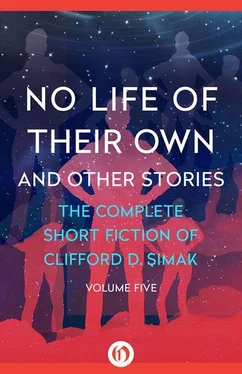“I took advantage of you,” said Anderson. “I had to tell it to someone. I’ve had it corked up in me too long. And I needed time.”
I gulped again. “Time—”
He nodded. “Time for the robots to take certain measures. By this time they have discovered something is wrong. They are quick at things like that.”
He seemed to be laughing at me.
“You’ll never leave this place alive,” he said.
We sat there looking at one another. He was smiling. I don’t know how I looked. I was mad and plenty scared.
“Don’t misunderstand me,” he said. “We mustn’t be dramatic. I don’t mean I am going to kill you. I mean that you will never leave this place. If you try you’ll most assuredly be killed. You see, I can’t let you go. Not knowing what you know.”
“You dirty—” but he stopped me.
“You asked for it,” he said.
A door back of the desk opened softly and a ray of light slashed into the room. Through the door I caught the glimpse of a laboratory.
A tall, gaunt man stood in the doorway. His face was pallid above the black lounging robe he wore.
“Anderson—” he began excitedly.
“Why, Ernie,” said Anderson. “I didn’t expect to see you. We have a guest. Mr. Sherman Marshall. He’s staying for a while”—he cast me a sidelong look—“for quite a while,” he finished.
“I am glad to know you,” Ernie said to me. “Do you, by chance, play whist? Anderson is no good at it. Claims it is old-fashioned—absolutely primitive.”
“I don’t know a thing about it,” I said, “but I’m handy with cards.”
“Of course,” said Anderson to me, “you must have guessed that Ernie is my partner in crime. Not quite as old as I am but almost. Ernie Hitchcock. Once one of the best captains that ever flew in space.”
“I came to tell you,” said Hitchcock, speaking to Anderson with the old urgency in his voice, “that there has been a reaction. The kind we were hoping for. I made sure before—”
Anderson’s hands grasped at the table.
“A reaction—” he choked. “You mean it … really … what we were looking for?”
Hitchcock nodded.
Anderson turned to me. “You will excuse us?”
I nodded, not knowing what to say. I was trying to make head and tail or what had happened. What did the tall, gaunt man mean by reaction? Could it mean that a cure had been found, after all these years, for the space sickness? Did it mean that Dr. Anderson, at the moment all seemed lost, had triumphed in this search that had stretched over three lifetimes?
The two went out the door, into the laboratory and I watched them go. Minutes dragged by. I got up and paced around the room. I stared at the books in the shelves, but there was nothing to interest me, mostly medical works.
Knowing it wouldn’t do me any good, I went to the door leading into the room where I’d bashed the robot on the head. I opened it and there squarely in front of it, stood a robot with his arms folded across his chest. He looked as if he were just waiting for me to make a break. He said nothing and I said nothing. I simply shut the door.
The radio caught my attention and I wondered if it would work. Anderson had said it hadn’t been tuned in for months. Radio reception usually is almost impossible here, but with the new broadcast units put in at New Chicago in the last few months it should be halfway decent, I thought.
I turned it on and the set lighted up and hummed. Swiftly I spun the dial to the New Chicago wave length and the voice of Jimmy Doyle, newscaster, blared out, somewhat disrupted by static, but still intelligible.
Jimmy was just starting his broadcast and what he had to say held me rooted to the spot —
“—still searching for Sherman Marshall, wanted for the murder of Eli Lawrence. A warrant was issued for Marshall’s arrest ten hours ago when a canvas bag belonging to the murdered man was found in an alley near the North Wall. Marshall’s fingerprints, the police say, were found upon it. A bartender at the Sun Spot, a night club—”
There was a lot more to it, and I listened, but it didn’t mean much. The things that mattered were my fingerprints upon the canvas bag in which old Eli had carried his salts and the story the bartender at the Sun Spot had told the police.
Back at New Chicago the cops were in full cry. Intent to hang the murder on someone. Anxious to make a showing because election was near.
And with those fingerprints and the bartender’s story it wouldn’t be so hard to hang it on me.
Numbly I reached out and snapped off the radio. Covering trials, both in New Chicago and back on Earth, I often had tried to put myself in the defendant’s place, had tried to imagine what he was thinking, how he felt.
And now I knew!
I was safe, I knew, for a while, for no one would think of looking for me here. Perhaps even if they did come looking they wouldn’t find me, for Anderson would want to keep me hidden. It would be to his interest to keep me where I couldn’t talk.
I thought back over the events immediately preceding and following Eli’s death—and I suddenly remembered the sand flask hidden in my dresser drawer. The sand flask with the white spaceship!
The door to the laboratory opened and Anderson entered the room. He was all smiles and he almost beamed at me.
“I have been thinking,” he said. “Perhaps I can let you go.”
“What’s that?” I yelped.
“I said I was thinking I needn’t keep you here.”
“But, Doc,” I protested, “I really want to stay. I think—”
And then I saw it wasn’t any good. If he was ready to let me leave, he would be no protection if I stayed.
“But why this sudden switch?” I demanded. “If you let me go, I’ll publish the story. Sure as hell, I will.”
“I don’t think you will,” he said. “Because I am trading you another story for it. A bigger story—”
“The cure? You’ve found the cure?”
He nodded. “There had seemed just one thing left to do. A very dangerous thing and with slight chance of success. If that failed, we feared that we were done. We had then explored every possibility. We had come to the end.
“We tried and failed—or so it seemed. But what had seemed failure was really success. The reaction was slower than we thought, took longer to manifest itself. We know now that we can cure the space sickness.”
He was staring at the wall again and there still was nothing there—
“It will take some time,” he finally said. “A little time to perfect the method. But I still have a little time … a little time … enough—”
“But, Doctor,” I yelled at him, “you must have some salts. You certainly didn’t use all that Eli brought you. There is no need to talk of time.”
He turned tired eyes to me.
“Yes, I have some salts,” he said. “Let me show you—”
He rose and went through the laboratory. I followed him.
From a cabinet above a sink he lifted down a box and opened it. Inside I saw the crystals.
“Look,” said Anderson.
He upended the box, dumped the salts into the sink, reached out and turned the tap. In silence we watched the water wash them down the drain.
“Try and tell that story now,” he said. “You’ll be laughed out of your profession. There is no evidence. I am the only evidence and I will soon be dead.
“I’ve waited for this day—for the day when I could pour them down the drain. I’ve done what I set out to do. I’ve taken the terror out of space. I’ve answered the prayers I have seen in the eyes of dying men. No one, even if they knew, and believed, my story, could say now that I had been wrong in doing what I did.”
“You forget just one thing, Doctor.”
Читать дальше












